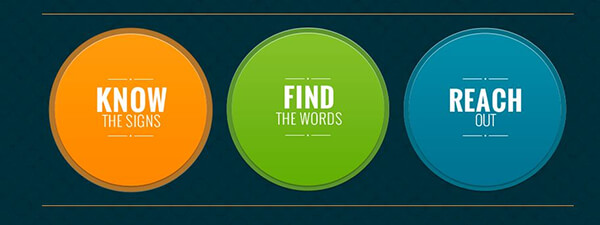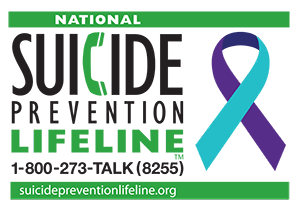
Someone dies in the US every 15 minutes from suicide. Startling, isn’t it? A report published in the American Journal of Public Health (2012) found that more Americans die by suicide than in car crashes, by homicide, or in other injury-related deaths. (Rockett, 2012). The workplace is the perfect setting to address the growing crisis of suicide since the highest incidence of death by suicide falls with the working age group, age 24-64. Taking the subject of suicide out from behind the cloak of shame will allow people to feel more comfortable seeking help.
September is National Suicide Prevention Awareness Month. And, World Suicide Prevention Day is September 10. All month long, mental health professionals, crisis centers, advocates and survivors will be working together to promote education and awareness of suicide risk factors and warning signs; educate people on how to speak to coworkers and loved ones about this complex topic and how to reach out to get help.
KNOW THE SIGNS
from Suicide Prevention Lifeline
Risk Factors
- Mental disorders, particularly mood disorders, schizophrenia, anxiety disorders, and certain personality disorders
- Alcohol and other substance use disorders
- Hopelessness
- Impulsive and/or aggressive tendencies
- History of trauma or abuse
- Major physical illnesses
- Previous suicide attempt(s)
- Family history of suicide
- Job or financial loss
- Loss of relationship(s)
- Easy access to lethal means
- Local clusters of suicide
- Lack of social support and sense of isolation
- Stigma associated with asking for help
- Lack of healthcare, especially mental health and substance abuse treatment
- Cultural and religious beliefs, such as the belief that suicide is a noble resolution of a personal dilemma
- Exposure to others who have died by suicide (in real life or via the media and Internet.
Warning Signs
- Talking about wanting to die or to kill themselves
- Looking for a way to kill themselves, like searching online or buying a gun
- Talking about feeling hopeless or having no reason to live (in person, by text and on social media)
- Talking about feeling trapped or in unbearable pain
- Talking about being a burden to others
- Increasing the use of alcohol or drugs
- Acting anxious or agitated; behaving recklessly
- Sleeping too little or too much
- Withdrawing or isolating themselves
- Showing rage or talking about seeking revenge
- Extreme mood swings
FIND THE WORDS
from Tennessee Suicide Prevention Network
Here are concrete actions you can take when you are concerned about someone who may be suicidal.
- Be aware. Learn the warning signs.
- Get involved. Become available. Show interest and support.
- Ask if s/he is thinking about suicide.
- Be direct. Talk openly and freely about suicide.
- Be willing to listen. Allow for expressions of feelings and accept those feelings.
- Be non-judgmental. Don’t debate whether suicide is right or wrong, or feelings are good or bad. Don’t lecture the value of life.
- Don’t dare him/her to do it.
- Don’t give advice.
- Don’t ask “why.” This encourages defensiveness.
- Offer empathy, not sympathy.
- Don’t act shocked. This creates distance.
- Don’t be sworn to secrecy. Seek support. Don’t leave them alone.
- Offer hope that alternatives are available, do not offer glib reassurance; it only proves you don’t understand.
- Take action. Remove means. Get help from individuals or agencies specializing in crisis intervention and suicide prevention.
REACH OUT FOR HELP
 Local Resources that can offer help, 24 hours a day, 7 days a week.
Local Resources that can offer help, 24 hours a day, 7 days a week.
| Methodist Healthcare Employee Assistance Program | 901-683-5658 |
| Memphis Crisis Center | 901-274-7477 |
| Police | 911 |
| Adult Mobile Crisis | 901-577-9400 |
| Youth Mobile Crisis | 1-866-791-9226 |
| Dennis H. Jones Living Well Network | 901-762-8558 |
| Suicide Prevention Lifeline | 1-800-273-8255 |
| Crisis Text Line | Text HOME to 741741 |
| Local Emergency Department | |
| Primary Care Physician | |
| Clergy person or Chaplain at work |
If you would like to know more about this topic, please consider following the Methodist Healthcare EAP facebook page and the Dennis H. Jones Living Well Network facebook page to see posts during National Suicide Prevention Awareness month. In addition, you can view a 12 minute webinar on the Methodist Healthcare EAP website regarding suicide awareness.
We appreciate your partnership is spreading education and awareness about the topic of suicide. If you or anyone in your home would like to discuss this or any other concerns, please call the Methodist Healthcare EAP where you have free, confidential counseling by a licensed counselor. There is hope and there is help. Call us at 901-683-5658.
 Donna DiClementi, LCSW, CEAP is Director of the Methodist Healthcare EAP. Donna received her Master’s degree in Social Work in 1989. She is a Licensed Clinical Social Worker and a Certified Employee Assistance Professional. Her experience includes EAP, hospital psychiatric and medical social work, crisis services and private practice.
Donna DiClementi, LCSW, CEAP is Director of the Methodist Healthcare EAP. Donna received her Master’s degree in Social Work in 1989. She is a Licensed Clinical Social Worker and a Certified Employee Assistance Professional. Her experience includes EAP, hospital psychiatric and medical social work, crisis services and private practice.
